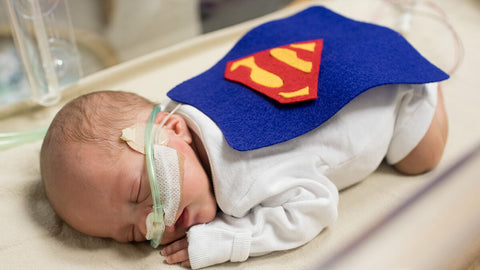Why Are Babies Born Premature?

Even with all of our medical and scientific advances, the cause of premature birth is unknown in about half of the cases. Some of the reasons babies are born too soon include:
- history of malnutrition, drug use, alcoholism, or smoking
- history of premature birth
- mother has an infection
- mother has health condition like diabetes
- multiple pregnancy
- pre-eclampsia
- problem with uterus or cervix
In the United States, about 380,000 babies are born prematurely each year. The preterm birth rate is 9.8 percent in the United States , which means that 1 in 10 babies is born too soon. Most pregnancies last 40 weeks, so an infant born before the 37th week is known as pre-term or by the casual term “preemie.” While this used to be quite serious, medical advances are such that more than 9 out of 10 premature babies not only survive, most go on to develop normally and have healthy lives.
While it is possible for babies born at 23 to 24 weeks to survive, the odds are shakier. Very premature babies are also at a higher risk of developmental problems. Some may need help breathing and will be cared for in a neonatal intensive care unit (NICU) which is, of course, nerve-wracking for parents and can also cause serious financial issues.
For moms who are less than 37 weeks pregnant and experiencing signs of premature labor, such as contractions, or a sudden cessation in the baby’s movements, a trip to the hospital is in order—it may be possible to slow down or even stop the labor. In these cases, the m other may be given medicines to pause the contractions for a while; or she can get injections of corticosteroids 12 to 24 hours before the birth to help the baby’s lungs function more efficiently. Even a few days more inside the womb can help a premature baby survive.

Once the baby is born, a medical team from the neonatal unit will take over immediately. It’s important that the preemie is kept warm and he may be aided in first breaths with an oxygen mask or breathing tube. Some more severe cases need help to keep their heart beating with cardio - pulmonary resuscitation (CPR) or even a careful injection of adrenalin. Once the baby is stable, he will be transferred to the NICU or SCN.
Some common issues for premature babies include:
- breathing problems
- heart issues
- infections
- jaundice
- sluggish digestion
- thin blood
Most premature babies will develop normally, but it takes extra time and care; the doctors will make sure the parents understand how to care for the baby at home and will do everything they can to aid in allaying fears and building confidence. There will be more neonatologist and then pediatrician appointments than what there would be for a full-term baby, at least for a few years.

Fortunately, technological and medical advancements and increasing expertise about the causes and care for prematurity are increasing these tiny babies’ chances for survival. During the last 10 years, the smallest baby saved has gone from 550 to 350 grams, and the youngest baby saved has gone from 26 to 22 weeks. So, a lot of great strides have been made—which is very encouraging.

